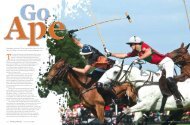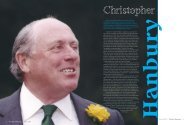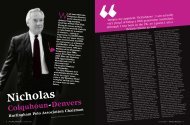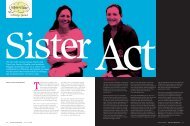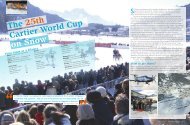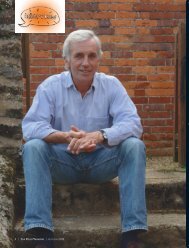Cow Williams - The Polo Magazine
Cow Williams - The Polo Magazine
Cow Williams - The Polo Magazine
- No tags were found...
You also want an ePaper? Increase the reach of your titles
YUMPU automatically turns print PDFs into web optimized ePapers that Google loves.
Son, save your moneyand buy land. <strong>The</strong> Lord ismaking no more.However, Richard Costain, a constructioncompany in England, was at this time buildingthe new deep water harbour and was lookingfor a dozer to spread the dredge fill anddemolish some unbelievably outstanding oldBarbados homes. <strong>Cow</strong> negotiated todemolish the homes and get the contractto put his tractor in the seawater to spreadthe fill. This was, you would understand,a 24-hour job and he had to fit in many atime to help exhausted operators, but earnedenough profit to equip the tractor throughthe Caterpillar agency with all the necessaryagricultural implements.It was then that C.O. <strong>Williams</strong>Construction Company was born.<strong>Cow</strong> received many calls to fill a hole, level apiece of land, demolish trees and clear afoundation for a home. He was on the road.In 1966, while on vacation, fishing withfriends from Trinidad, Hugh Gransaul askedhim if he knew that General Crude, an oilcompany from Texas, was going to drill for oilin Barbados. He said no. Hugh immediatelyvolunteered to write to the president of thecompany and introduce <strong>Cow</strong>. <strong>Cow</strong> got thecontract to prepare the locations with thehelp of his then father-in-law, Carson Walcott,and a young operator whom he had taughtto operate, Wendall Butcher. It was here that<strong>Cow</strong> learned that there was no such thing as‘time’ in an oil company’s modus operandi.It had to be done, period.For the first seven years, General Crudetested his resolve to continue to work forthem by moving the rigs every Christmas Dayand Good Friday. He is happy to report thatfrom 1966 until this day, C.O. <strong>Williams</strong> has<strong>Cow</strong> (second from left in shorts) as a child...constructed every drilling location inBarbados, even though the oilcompany has had three differentowners. <strong>Cow</strong> formed a limitedliability company in 1969 with a youngman called Micky Hutchinson andC.O. <strong>Williams</strong> Construction Limited wason the way. Both men had very similarwork practices and ambitions and thecompany grew to become one of thelargest civil construction firms in theWest Indies, working from St Vincent andthe Grenadines to the Bahamas.How did Apes Hill come about?<strong>The</strong> day that <strong>Cow</strong> went to work in 1951,his mother gave him the best advice thathe has ever had: “Son, save your moneyand buy land. <strong>The</strong> Lord is making nomore.” He has never departed from thatpolicy. Apes Hill was a sugar plantation,which he bought in 1981 and convertedinto a dairy farm, which Stephen, his eldestson, then managed. It was at this time thathe realised that the production of sugar wasa dying means of earning a living andagriculture, on the whole, was difficult.And so his construction operation ledhim to Apes Hill, the dairy farm from whichhe has now relocated the cows and turnedinto an amazing 470-acre polo, golf andresidential community. He describes the landas, “Just the most beautiful piece of land in theworld!” and you know what? He’s right.Straddling the island with views to both theAtlantic and Caribbean seas, it is a trulymagnificent spot that he, and his partners in thedevelopment, Landmark, should rightly be veryproud of....and a young man<strong>The</strong> poloSo, that is history dealt with, but what wepolo-addicts REALLY want to know about is howthis strong character in the Clubhouse and on thefield first got started in polo. Here, he elaboratesto <strong>The</strong> <strong>Polo</strong> <strong>Magazine</strong> on everything from mulesto Smiths Lawn and everything in between.“My earliest memories are of being on thefarms with my brothers and sisters and Daddy.By the time I was ten, I was helping them bring inthe cane from the fields. In those days the canewas transported to the factory via mules and the‘leader mules’ worked much like a steeringwheel – needing regulation – and had to beridden. So, every Easter vacation, I would take onthe role of ‘leader boy’ and ride these things infrom the field with nothing on but my shorts andshirt. At the end of the vacation, I would have twoholes, the size of 50-pence pieces in my buttockswhere the bareback riding had rubbed me raw!“That’s how I learnt to ride and, every daywhen Daddy rode in from the fields, as a 4- or5-year-old, I would run to meet him, put myfoot in the stirrup and ride home. I just loved it.In those days we had about three domesticmaids, one to cook, one to wash and one tolook after us children. One particular day we hada new maid who didn’t know the drill about mydaily routine with Daddy. I remember she washolding me back – so I threw dog shit in her faceand ran off! Suffice to say I got a beating fromDaddy – I’ll carry the marks from that to mygrave. I knew I’d been naughty and it didn’t reallydo me any harm, but I was too scared to livewith him, so I was put with my grandmother forabout four months.“When Daddy bought Foster Hall, he soldevery physical possession we had, includingfurniture, farmyard animals, horses, etc, and itwas then there were tears, tears and more tearswhen we saw them leaving the farm.However, all 11 of us moved to Foster Hallwith only Daddy and Mummy’s bed in whichthe two small ones slept with them and the restof us on the floor with makeshift mattresses.My father and mother were the best rolemodels any person could want. <strong>The</strong>y workedlike slaves to feed us and educate us.Daddy then was able to get his own two poloponies but the <strong>Polo</strong> Club, which was startedback in 1939, was 14 miles away from the farm.“I, of course, was desperate to play polo butcould not as Daddy only had two horses; but Ihad the privilege of getting up at four in themorning and stopping halfway at a friend’shouse to feed, water and to give them a rest,before saddling up and riding them to polo,where they would play two chukkas each!And then, because there was nowhere near thevolume of traffic we have today, we would ridethem home, again stopping halfway.Daddy would pick me up and take me hometo bed. And this would happen everyweekend – but I really enjoyed this and it wasnot an imposition.“As for the polo, I was given anotheropportunity in life! <strong>The</strong> Manager on one of thefarms where I worked was allowed to keepfarm ponies, and he and his overseer wereallowed to use the farm horses to play polo on weekends.I played cricket while I was working as Under Manager on thisfarm as I was not allowed to use the farm ponies for polo, asthe Manager said polo was not meant for horses, racing was.“At the end of the cricket season, I would go to polo towatch Daddy and his friends play and it was whilst I was therethat Mr Colin Deane, of a famous polo-playing andagriculture family, saw me sitting with what I suppose was aforlorn expression. He asked me if I would like to play, I toldhim yes but that Mr Victor Weekes, one of Barbados’s mostoutstanding horseman and his overseer had the exclusiveuse of the plantation ponies while I sat and watched.Quite unbeknown to me, Mr Deane called Mr Douglas Pile,whose family was then the largest landowner in the island,and told him my predicament. Mr Pile enquired through myManager, Mr Howell, if this was so and if Iwould like to play. I, of course, jumped at theopportunity and Mr Pile immediatelytransferred a fantastic small pony called Flashto the farm I was on. This is how I started.“I then continued to play him for twoyears, but unfortunately moved to anotherfarm and as explained above the Managerprohibited me from playing polo. I then gota job as an Under Manager and wassecond in command to a greatthoroughbred horseman who had bredsome Derby winners. He asked me if Iplayed polo, but said that I wasn’t going tobe playing whilst working for him, so thatwas it, the end of my polo for a while.“I used to play a lot of cricket too,but I had an accident and slipped a discand ended up in traction for a couple ofweeks – I was supposed to be a bowlerbut after that I didn’t really want to play,so when I got out I thought I’d take my$250 a month salary with a wife andtwo children and buy a horse so Icould play polo again. This was at thetime when I took over at Foster Hall.Someone gave me a beautiful Englishthoroughbred colt, which had justretired from a very successful racingcareer. He was the son of the greatSanta Claus. When the formerowner realised that I had castratedhis colt to play polo he was notamused. He turned out to be a wonderful polo pony.“That was in ‘62 and I have a lot of excellent memoriesof that era. <strong>The</strong> polo was relaxed and our players didn’t evencarry handicaps. We had an invitation from Jamaica to take ateam of Bajans over to play there – that was our first tour in‘64. <strong>Polo</strong> was pretty advanced in Jamaica and their horseswere good – after all, ours were only farm horses and I usedto play in Jodhpur boots and breeches. I had to borrow apair of boots from a good friend, Tony Archer, to be able toplay in Jamaica. <strong>The</strong>re was great excitement and seven ofus volunteered for selection, one of which was Daddy,at 66 years old. Fancy, we even had trial games and, oneafternoon, when Daddy was not playing in the trials, I askedhim if he would lend me his two ponies, which were farbetter than mine. His response was, ‘Son, I am very sorry,but you and I are vying for the same place on the team.Try your best with your own’. I was chosen only twoyears after I had been playing regularly for this tour and,understandably, we were fairly thrashed by theJamaican team.“On returning home, the Barbados <strong>Polo</strong> Club discussedhandicaps at a committee meeting and it was decided not toadopt the system. I was appointed Club Captain and we hada much more competitive series, as we had learned a lotfrom the Jamaicans, and I was instructed by the Committee ofthe Barbados <strong>Polo</strong> Club to ask the Jamaican <strong>Polo</strong> Associationto handicap our team.“Our next invitation to Jamaica, which alternated withinvitations for them to play in Barbados, was in 1969. Daddy,unfortunately, had passed away, but he had left $8,500 for allof us – I spent every cent of mine to buy four polo ponies inJamaica, one of which, Raquel, had come out of the strengthof Mr John Lucas who had won the Gold Cup in the previousyear. This pony, along with one named Doritta, bought byMr Vere Davies, were the first two ponies to come toBarbados costing £1,000 sterling.Boy, did this provide grist for theAt the endof the vacation,I would havetwo holes,the size of50-pencepieces in mybuttocks wherethe barebackriding hadrubbedme rawgossip-mongers! I bought anotherthree, one gelding and two mares,and played them all for many yearsand bred them all and, to this day,their progeny rate very highly in qualityamongst my polo string.“I was wiped out financially but, tome, polo was everything. One couldask how come you got all these ponies?Mr Willy Delicer, Mr <strong>Polo</strong> of Jamaica,whose son had played in England withhim, had apparently lost a tournamentplaying against a team with a lady in it.Mr Willy Delicer, one of the greatestpeople I ever met, and a typical machoJamaican, gave his son such a hard timethat he gave up polo. Hence, the reasonwe acquired these ponies.”<strong>The</strong> present-day Barbados <strong>Polo</strong> Clubwas reformed in 1939 and polo wasplayed at the Garrison Savannah, theformer British Army headquarters. But, in1966, when the country attainedIndependence, it was decided that it wasnot exactly the correct thing for theBarbados plantocracy to be playing polo onGovernment property, especially as this wasthe area where the Union Jack was loweredand our flag raised. This was understandablebut, fortunately, John Kidd, the son of theHonourable Janet Kidd, was a championshowjumper and had started to show tremendous interest inplaying polo. John started his polo in Barbados and eventuallywent on to attain a 5 goal handicap and play in high goaltournaments in England. <strong>The</strong>re was nowhere to play,but Mrs Kidd had bought Holders Plantation in St James andshe, to everyone’s eternal gratitude, offered two cane fieldstotalling 15 acres as a polo field. <strong>The</strong>se were relatively flatbut very rough and rocky. However, the Deane family and<strong>Cow</strong> owned Caterpillar tractors and volunteered theequipment to do the necessary earthmoving, including rockexcavation for petrol and labour costs only.Hence, the Barbados <strong>Polo</strong> Club started on a newground. Every weekend, <strong>Cow</strong> would bring tipper trucks onSunday mornings to Holders, where many members wouldcome to pick off the rocks and plant the grass. <strong>The</strong> firstclubhouse, for an American tournament from Potomac,Maryland, led by Tommy Dowd, consisting of Dick Moran,Halter Cunningham and Frank Wilson, was built of fenceposts and covered with coconut limbs. <strong>The</strong> Barbados <strong>Polo</strong>Club, at this stage, had a strong community presence and10 | THE POLO MAGAZINE | MIDSUMMER 2009MIDSUMMER 2009 | THE POLO MAGAZINE | 11
camaraderie and continued to grow and flourish with return tours from Jamaica, Potomac and Toronto.In 1972, the Club received a surprise suggestion from Mr Harold Bamburg of the then Eagle Airlines tobring a team to Barbados, consisting of the Honourable Mark Vestey, Victor Law and Major AndrewParker-Bowles. <strong>The</strong> Club jumped at the opportunity, had a fabulous tour, good support from theBarbados horse community and this was another launching pad for the Barbados <strong>Polo</strong> Club and <strong>Cow</strong>.Harold and Mark invited them to bring a team to England and again they jumped at thisopportunity, and Arthur <strong>Williams</strong>, Andy Dowding, Owen Deane, Keith Melville, our President, and<strong>Cow</strong> as Captain, toured England. <strong>The</strong>y played two matches at Guards in which they did reasonablywell and one at Cirencester in which they were thoroughly thrashed by young English polo player,Robert Graham. <strong>The</strong> team learned a lot on this tour and <strong>Cow</strong> foolishly started his polo-pony-buyingspree. <strong>The</strong> excitement of playing in England and meeting English players and the famous Mrs IoneO’Brien of Park House in Midhurst was too great to resist. <strong>Cow</strong> went back in 1973 with the intentionof buying ponies to improve the quality in Barbados and, of course, his polo also.It was on this visit that <strong>Cow</strong> met people of the polo fraternity who impacted significantly on hisfuture in polo, namely, Ronnie Driver, Colonel Tatham of <strong>Cow</strong>dray, Mervyn Barnes and his wife Bobby,Jack <strong>Williams</strong>, Eddie Moore and Hector Barrantes. He made it known that he waslooking for ponies and arranged to buy four or five. <strong>Cow</strong> bought his first ponyfrom the late Jack <strong>Williams</strong>, an Argentine mare, and was in the process ofpurchasing four ponies from Derek Barnes of Cheshire when he againregistered a landmark in his life.“I was sitting at a dinner table in Park House, during the week of <strong>The</strong>Challenge and <strong>The</strong> Harrison Cups, which were right after the Gold Cup, allalone. I was then approached by a very serious and angry looking gentlemanwho didn’t pull up a chair but rested on the corner of the table and said tome, ‘Are you <strong>Cow</strong> <strong>Williams</strong> from Barbados?’ He terrified me. I said, ‘Yes,Sir’. He then went on to say, ‘My name is Micky Moseley and I am incharge of selling Mr Derek Barnes’ ponies and I know all youcolonial people from the West Indies to be very smart anddevious people. I am now informing you that these poniesare not leaving England or even being vetted until you canprove to me that you have the funds to purchasethem’. To say I was gobsmacked is anunderstatement. <strong>The</strong> ponies were £1,000 apieceand I meekly proved to Mr Moseley that I had thenecessary funds, by which time my dinner hadbeen spoiled, the majority left on the plate, buthe invited me into the bar to have a drink.“This was how I met the legendcalled Micky Moseley. We proceededto indulge in his famous pastime,which was drinking for too long atime for my capacity. I ended upby inviting him to bring a teamto Barbados that same nightand he thus developed anunbelievable relationship withBarbados <strong>Polo</strong> Club and itsmembers, visiting Barbados with ateam from the Cheshire <strong>Polo</strong> Club,which at times consisted of players other thanCheshire players, until he died in 1997. An unbelievable novel could be andshould be written on this man’s relationship with Barbados and the <strong>Polo</strong> Clubmembers. Howard Taylor, also a member of Cheshire <strong>Polo</strong> Club, took up themantle after ‘Mr Micky’s’ retirement and has carried it on every year until now.“<strong>The</strong> question was asked earlier on: ‘How come you got into polo and continueto do so?’ I went to England every year from 1972 until 1991 and played lots of poloand made many, many friends. So you can understand how nostalgic it was for me to goback to England in 2006 to meet so many old friends.“Now to the crazy and exciting things we have done in polo. On one of the Jamaicanpolo player’s trips to Barbados, when our polo had improved tremendously as well as our ponypower, we beat a young Jamaican team consisting of their three best young players and seasonedCaptain. Soon after this tour I visited Jamaica as a Captain with a young team and our schedule wasarranged to play against the young team that we had beaten in Barbados. We were beaten by one goalin a very hard-fought match and lots of complaints from both teams about the umpiring. We thenproceeded to the last chukka in the pavilion, which is always a very exciting and ferocious one. It wasat this stage that one of the very senior polo players, namely Mr Willie Delicia, mentioned above,said to me, ‘<strong>Cow</strong>, you see if you give the boys good ponies in Barbados they will beat you there too’.I was wiped outfinancially but,to me, polo waseverythingOn the field in Barbados, 200912 | THE POLO MAGAZINE | MIDSUMMER 2009MIDSUMMER 2009 | THE POLO MAGAZINE | 13
This remark sent a rod of steel up my ‘you knowwhat’ and I said to myself: I’ll prove you wrongone day.“In 1980, madness took place after aninvitation from Jamaica to send a team. I charteredan aircraft, sent 10 or 12 ponies to Jamaica with ateam of Roger Gooding, Kent Cole, Stephen<strong>Williams</strong>, and Desmond Maynard to prove thatwhat Mr Willie had said was incorrect.<strong>The</strong> experience was quite frightening. <strong>The</strong> ponieswere placed in quarantine in a mosquito swampand when I arrived there a week after they weresupposed to be coming out of quarantine, thestench of citronella as I drew close to the stallsknocked me back. I asked Mervyn Barnes, whom Ihad met in 1973 and invited to Barbados, alongwith his wife, to show us how to make poloponies and had accompanied the horses toJamaica, ‘Why the citronella?’. It was then that heinvited me to see the horses, which were all blackwith the citronella, which was used to keep off themosquitoes. One particular English thoroughbredmare was covered in whems the size of thequarter of a grapefruit. She had reacted, as all ofthem did, to the mosquito stings. However, wegot them out shortly after we played our game inKingston against All Jamaica and barely beat themby one goal.“<strong>The</strong> second game was a little more successfuland we beat them by two goals. <strong>The</strong> third showedup, at which we were supposed to be put in ourplace at Drax Hall in St Ann. We gave Jamaica asound thrashing from 9 goals to 2. <strong>The</strong>re weremany tears and many happy Barbadian faces. In themeantime, after we had moved to Holders,Barbadian teams visited Jamaica, Venezuela,Dominican Republic, Canada and England.Although I had played lots of polo in Englandbetween 1972 and 1990 and bought ponies formyself and other Barbadians during that time,I had never been able to put a team together,except in 1986, which could be consideredmoderately successful. However, Mr Roddy Driverof San Flamingo, who employed Mervyn Barnesas his Stable Manager, visited Barbados severaltimes with teams from England. In 1975, he invitedme to play with him in the Royal Windsor andthe Warwickshire. I was absolutely ecstatic,going to play polo with the San Flamingo team,but no ponies.“It was then that I learned that an Americancalled Bennett had four ponies in Midhurst atMr Peter Stent’s farm, which had to be sold. Iarranged with Mervyn Barnes, who had beenvisiting Barbados the previous three years, to lookat them. I bought the four of them unseen andunvetted. Three of these turned out to bemoderately good and one was 16 hands high,which was far beyond my capabilities. However,we played in the Windsor with Howard Hipwood,Ronny Driver, a young English army captain; I thinkhis name was Stakemyer, and myself. It was a greatexperience and initiation for me. This was 15 goalpolo of a very competitive type.“We then went on to play in the Warwickshirein Cirencester, at which we won the subsidiary withHoward Hipwood, Alan Shearer, Ronny Driverand myself. This was a landmark I will never forgetas I was playing with three of the nicest people thatI have ever met. Our team spirit was unbelievable.“I still hadn’t fulfilled what I wanted to do, that isto win a medium goal tournament in England,although I was visiting every year. I bought ponies,sometimes three, sometimes four at a time, playedwith different teams, had moderate success in 1987and enjoyed an incident which is fresh in mymemory to this day. Mr Micky, on several of hisvisits to Barbados, brought Mr Colin ‘Sooty’Dhillon, a tremendous character and as competitiveas myself. We became great friends and oneafternoon, at Cirencester, Mr Micky arranged amatch in which we played against each other.We played in front of a reasonably large crowd and,when the game was over, I had to leaveimmediately. While I was walking behind thevisitors’ cars, I saw four beautifully dressed elderlyladies enjoying a picnic and, as I passed, one said tothe other, ‘I am confused: I don’t understand.<strong>The</strong>re is a black man talking like a white man and awhite man talking like a black man’.“1990 arrived with me shipping 14 ponies toEngland to play with Johnny Kidd, Johnny Wadeand Juersey. Again, I indulged in a little madnessand we entered a lot of 10 goal and 15 goaltournaments, including <strong>The</strong> Cicero and <strong>The</strong>Harrison. It was a lot of fun but it was just madness;I mean I would leave Barbados on a Friday night,fly to Heathrow, pick up my car and nip down to<strong>Cow</strong>dray. <strong>The</strong>n I’d sleep for a couple of hours, playSunday, be on the return flight home Monday andbe in meetings in St Lucia for Tuesday morning!I did that for close on eight weekends running andwe were doing well. <strong>The</strong>n Jeff Lawson (one of thenicest people I have ever met) asked if I could stepin for him in an 8 goal match. During the game,I fell and the horse caught me on its struggle to getback up and broke my leg – that was it for me thatseason. Unfortunately, because the team had beendoing so well, I’d already had a couple of extraponies on their way over and, after that incident,the team just didn’t gel so well, so I had to get allthe ponies home. I was actually quite lucky in theend and managed to squeeze them into a planethat was shipping 150 goats to Trinidad! Most ofthem were billy goats and the stench washorrendous – one of the grooms had to burnhis clothes and we were washing the ponies forweeks afterwards!“I had one disappointment from that seasonand that was that I hadn’t done what I set out to do– win a medium goal tournament. So, the followingyear, 1991, I asked Johnny Kidd if he would beinterested in putting a team together – he said yesand I leapt on a plane and scoured the clubs forponies and players. Everything moved very quicklyand everything was organised. Done! That is theway I like to work! Nicky Evans, Johnny, Jack Kiddand I had a successful season and that year we wonthe Autumn Cup 15 goal tournament. We beat themight of a 9 goal Julian Hipwood teamed withTerry Hanlon, etc, and I found that very, verysatisfying and, at that moment, my polo ambitionwas fulfilled – I’d really accomplished what Iwanted to.“After that, most of my polo was familyorientated and friendly – playing a lot at Cheshireand Beaufort (back in the days when Beauforthad just started and was merely one ground!).Of course, the massive disappointment for me waswhen my son, Steven, had his accident whilstplaying – we’d won everything playing as a familyand that was a great shame when he was unableto play anymore.“To say polo was a part of my life? Sure bet.Did I enjoy it? Do I enjoy it? Most definitely! I’vemade some great friends in this sport and I continueto love the game. We used to play a lot in Cheshireand I got to know the Taylors very well – now ateam from Cheshire comes every year on a tourto Barbados. Cirencester is another great Club withmany great friends – I have a lot of memories.”<strong>The</strong> Apes Hill Team“In 2006 I went to <strong>The</strong> Gold Cup with theHipwoods, the Morleys and the Vesteys, andwatched the game with a real feeling of disbelief.<strong>The</strong>re I was sitting in the grandstands watching theBritish Open and the game was being played by sixArgentines, an Aussie and a Swiss and I felt nostalgicbecause I remembered the days of when I firststarted out in English polo. I couldn’t understandwhy some Englishman with deep pockets didn’thelp these English boys out. I was accustomedin the ’70s and ’80s to seeing people likeMr Ronnie Driver, Mr Moller, Mr Galon Weston,Harold Bamburg, Anthony Embericos,David Jamison, etc, sponsoring the likes ofPaul Withers, the Hipwood brothers, Alan Kent,Johnny Kidd, etc, but there I was, sitting withLuke Tomlinson and Malcolm Borwick and theyweren’t being supported. At the time we were<strong>Cow</strong> pictured with his wife, Mary-Ann at home in Barbados, 2009building Apes Hill Barbados and I thought,‘10,000 people attend <strong>Cow</strong>dray and double thatfor Cartier Day – what better way to advertiseApes Hill than to promote a team with access toso many high earners in one location?’“After the international game, I said toClaire Tomlinson that I would like to play anall-England team for the Queen’s and Gold Cupthe following year and that I would like to chooseLuke as Captain. Well, she looked at me as if I hadsaid something incredulous. But then she lookedagain and realised that I was serious – we hurriedover to see Luke who was leaving for Sotograndewith Carlos Gracida to earn some pesetas. He, likehis mother, found it hard to believe what I wassaying – you could tell by his expression that hewas asking himself why we were spouting all thisbollocks at him just before he left for Spain.‘Do you know any more jokes, <strong>Cow</strong>?’ was his14 | THE POLO MAGAZINE | MIDSUMMER 2009MIDSUMMER 2009 | THE POLO MAGAZINE | 15
expression. He started to move away, his mother grabbed him byhis team shirt and said, ‘Listen to what <strong>Cow</strong> is saying’. He hesitated,looked annoyed and said he would give it some thought andrespond when he came back from Sotogrande. Both he andClaire discussed the matter by phone on his return and decided thathe would take the matter seriously. I asked him to pick the teamthat he thought could do it. We had some differences, but heprevailed. In the meantime, I had to make the phone call to mybusiness partner. It was a tricky call – I had just committed millionsof dollars of our money to promotion inpolo, in the UK!“That year’s Queen’s Cup, I have tosay, I felt we were hard done by, and thenthere was the nightmare of the Gold Cupwhen Mark sliced open his hand.We played each game with a differentplayer and it just wasn’t working. I askedmy business partner if he‘d go a secondyear, and once again he trusted me andagreed to it. We were moderatelysuccessful in the Queen’s Cup as wewon the subsidiary, but we didexperience issues in the Gold Cup,which caused me tremendousdisappointment and dissatisfaction.HRH <strong>The</strong> Queen presents <strong>Cow</strong> with theQueen's Cup 2009“I was determined, after I had seen how hard the players hadtried, against all odds, to make another attempt at winning one orboth trophies. We, however, could not have the same teambecause two of our players had been raised in handicap, putting theteam above the 22 goals required. Luke, Mark and I had a meetingand chose a new team, which included one Argentinean, Juan Gris.Luke was particularly keen on this youngster whom he thoughtwould give us the punch up front, which we had somewhat lacked.Lots of people, especially journalists, ask if I think that the exampleI set by having four pros would change the way English polo isplayed. I can state here, quite categorically, that I never set out tochange polo by having an all-pro team. My objective was todemonstrate that if English players were given the opportunity theycould compete successfully against the imported professionals.I am more than satisfied that I have proved my point. I wouldultimately like to have three pros and a family member to competein these tournaments. I would be more than delighted to seemy son, Teddy, accept my invitation to do so.“<strong>The</strong> Apes Hill directorate decided that they had spent enoughon polo, but I was, and am, committed to Luke and the boys whohave chosen to compete seriously and, hence, I took it upon myshoulders, which are buckling under the financial pressures, to givethem the best opportunity possible and, in this respect, organise forthem to play in Argentina as much as possible. I cannot thankSimon and Claire Tomlinson and Christopher and Bridget Hanburyenough, for the support they gave to their sons in this year’stournament. <strong>The</strong> moral support from these families was, and is,unbelievable. It is very seldom that you see ayoung player like Juan Gris, an Argentinean, fit inand progress as he did in these two tournaments.I cannot ever explain the sheer delight at seeingthese four young men play what I consider to bethe best team polo I have seen for many, many ayear. <strong>The</strong>y played consistently as a team, alwayssupporting each other and never being selfish withthe ball, as is wont today, in high goal polo. <strong>The</strong>practice in polo and physical preparedness wasunbelievable. <strong>The</strong>y were totally dedicated, playing sixgames without losing, although three of them werewon in an extra chukka so, in truth and in fact, theysaved me the cost of a medical check-up, as I nowknow my heart to be perfect. To experience thetremendous support by families and friends at Guards,match after match, was unbelievable.“Added to all of the above and, in light of the high goal teamwinning five trophies, namely the Queen’s Cup, Gerard Leigh Cup,Perodo, Smith Ryland and now the Colonel Tatham Cup in theGold Cup subsidiary, and the Apes Hill medium and low goal team,with Tom Hunt and George Gemmell choosing smart teams andfollowing the example of the Big Apes, the Baby Apes have wonthe Eduardo Rojas Lanusse Cup, the Queen Mother’s Cup,the Novices Cup and others, and been in the final of three othercompetitions, all of which adds up to Apes Hill having an absolutelyglorious English polo season. None of this could be accomplishedwithout the phenomenal support and dedication of the stablemanagement and grooms. It is not over yet – the Baby Apes havewon their first two games in the Prince of Wales Cup and are ontrack for the Final. I have enjoyed the support of lots of old friends,young friends and especially my wife, Mary-Ann, during this veryexciting season. What better pleasure, satisfaction, delight andexcitement could an old codger of 76 want?”Celebrations! Apes Hill win the Queen's Cup 2009What better pleasure,satisfaction, delight andexcitement could an oldcodger of 76 want?16 | THE POLO MAGAZINE | MIDSUMMER 2009



